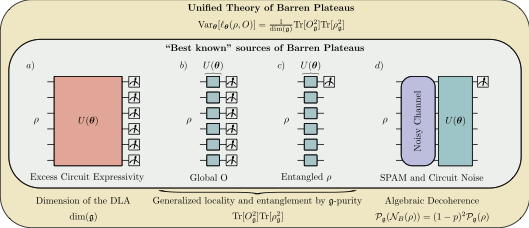Abstract
Variational quantum computing schemes have received considerable attention due to their high versatility and potential to make practical use of near-term quantum devices. At their core, these models train a loss function by sending an initial state through a parametrized quantum circuit, and evaluating the expectation value of some operator at the circuit’s output. Despite their promise, it has been shown that these algorithms can exhibit barren plateaus induced by the expressiveness of the parametrized quantum circuit, the entanglement of the input data, the locality of the observable or the presence of hardware noise. Up to this point, these sources of barren plateaus have been regarded as independent and have been studied only for specific circuit architectures. In this work, we present a general Lie algebraic theory that provides an exact expression for the variance of the loss function of sufficiently deep parametrized quantum circuits, even in the presence of certain noise models. Our results unify under one single framework all aforementioned sources of barren plateaus by leveraging generalized (and subsystem independent) notions of entanglement and operator locality, as well as generalized notions of algebraic decoherence due to noise. This theoretical leap resolves a standing conjecture about a connection between cost concentration and the dimension of the Lie algebra of the generators of the parametrized circuit.
